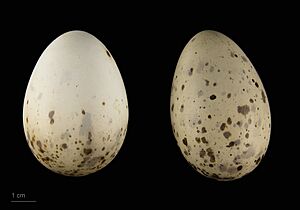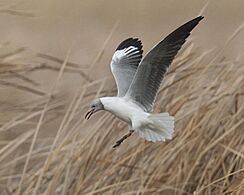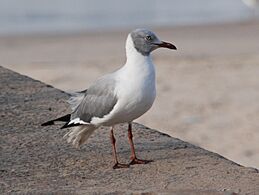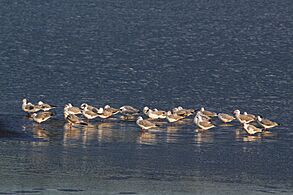Grey-headed gull facts for kids
Quick facts for kids Grey-headed gull |
|
|---|---|
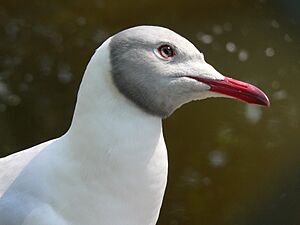 |
|
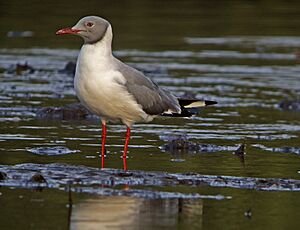 |
|
| Captive bird and a breeding adult, Senegal | |
| Conservation status | |
| Scientific classification | |
| Genus: |
Chroicocephalus
|
| Species: |
cirrocephalus
|
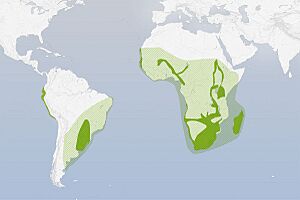 |
|
| range resident vagrant | |
| Synonyms | |
|
Larus cirrocephalus |
|
The grey-headed gull (Chroicocephalus cirrocephalus), also called the gray-hooded gull, is a small type of gull. These birds live and have their babies in certain areas of South America and Africa, south of the Sahara desert. They don't travel long distances like some birds, but they spread out more during winter. Sometimes, a few of these gulls have been seen far from their usual homes, like in North America, Italy, and Spain.
Contents
What Are Grey-Headed Gulls Like?
These gulls are a bit bigger than the black-headed gull. They grow to about 42 centimeters (16.5 inches) long.
How to Spot a Grey-Headed Gull
When it's summer, adult grey-headed gulls have a light gray head. Their body is also gray, but a bit darker than a black-headed gull. They have bright red beaks and legs. The tips of their main wing feathers are black, but they have cool white spots that look like "mirrors." The underside of their wings is dark gray with black tips. In winter, their gray head color fades, leaving just some dark streaks.
Both male and female gulls look very similar. The gulls living in South America are a little bigger and have lighter backs than those in Africa.
How They Grow Up
It takes two years for a grey-headed gull to become a full adult. Young gulls in their first year have a black band at the end of their tail. They also have more dark areas on their wings.
Flying and Sounds
When these gulls fly, their wings look wider and flatter compared to a black-headed gull. They are also quite noisy birds, especially when they are together in large groups. Their call sounds like a loud, rough "caw, caw," similar to a crow.
Where Do Grey-Headed Gulls Live?
These gulls are very common in certain places. They like to live near coasts or in areas where rivers meet the sea. You won't often see them far out in the ocean.
Their Homes and Habits
Grey-headed gulls build their nests and raise their young in big groups called colonies. They often choose places with lots of reeds and marshes. They lay two or three eggs in a nest. These nests can be on the ground or even floating on the water!
In winter, these gulls love to be with other gulls. They gather in large groups to find food and to rest at night. Sometimes, hundreds or even thousands of them can be seen together if there's a lot of food available.
Images for kids
-
A grey-headed gull during winter in South Africa.
-
An adult gull in winter, seen in Bakau, Gambia.
-
A flock of gulls near Lake Elementaita, Kenya.



